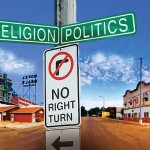I’ve been thinking about grace and humility lately. Last Sunday in the Spirit Circle discussion group at my local UU congregation, we were talking about who to credit/blame for the good/bad in our lives. The Christian in our group shared his belief that, whenever his life goes wrong, he knows he has done something wrong, and whenever something good happens, he believes it is God’s blessing. He actually referred to the “Footprints” poem. (I think I rolled my eyes involuntarily.)
His comments made me think a weird little movie called Julian Po, starring Christian Slater which I saw years ago. One part of it stuck with me. In the movie, Slater’s character is asked by the local pastor (who is having a crisis of faith) if he believes in God, and Slater’s character responds: “Somebody has to apologize.” Heaven, he says, is where God apologizes. And if God doesn’t feel like apologizing, then you’re in hell. If I were to believe in an anthropomophic God, I would probably be more like Julian Po than the author of the Footprints poem. I responded to the Christian that, for years, I believed like he did. And in my case at least, giving God all the credit and heaping all the blame on myself just resulted in tragically low self-esteem. I went on to say that I prefer to take all the credit and all of the blame. That’s been my M.O. now for years.
Even as I said this, though, I thought about how my attitude has made it so difficult for me to collaborate with other people in any part of my life. My words also rang untrue, because I was not acknowledging all the ways that so many other people have helped me along my path. And as I write now, I’m thinking about how my statement did not acknowledge the impersonal accidents of birth and genetics. Another person in the group challenged both me and the Christian. He suggested that religion is not (primarily) about assigning credit or blame, but about teaching humility — humility, not in the sense of self-abasement, but in the sense of an acknowledgment of all that is beyond our control. That would presumably include both the good, which is often called “grace”, and the bad, which is called . . . what do we call “bad” grace?
The idea of aknowledging what is beyond our control came up earlier in response to my post on prayer. M.J. Lee wrote:
“In some ways I see petitionary prayer as an acknowledgment of the limitations of human action and will. We can’t do it all on our own; if we are to succeed in anything we will need some cooperation from Nature. There is always an element of luck in any success. It seems to me that modern people don’t like to acknowledge this. Does prayer help secure luck? Probably not, but it makes me feel humble, reverential and thankful for all the ways that Nature has in fact been kind and generous to me. I am somewhat of an anxious person and acknowledging that it is not all up to me makes me feel more peaceful and ironically more willing to face the challenges and uncertainties of life.”
M.J.’s comment got me thinking petitionary prayer in a whole new way. Shortly after, Teo Bishop wrote this on his blog, which was then reblogged on the Wild Hunt:
“From the perspective of this mortal man, I see grace as a process of surrendering to all which one does not have control over. As powerful a mage as you may become through your religious work, I don’t believe one can control everything. Your will, after all, is not the only will. I do not see one needing to connect grace to a particular theology, or to a single deity, in order for it to have relevance. An atheist, for example, might experience grace by remembering and recognizing that they fit within a greater, more complicated, more interconnected ecosystem. Grace occurs in conjunction with that kind of humility.
“I’m still piecing this together for myself, but I think my religion might better understood as a relationship between one’s will and one’s openness to grace. Perhaps I’m attempting to strike the balance between the two in order to discover and negotiate my place within the cosmos.”
The common theme running through all of these comments is the idea of humility — humility arising out of an acknowledgement of our limitations. And I think a sense of reverence, while not the same as humility, is what flows out of that humility. Reverence, in turn, leads to an openness to grace. As Annie Dillard writes in Pilgrim at Tinker Creek, the answer to the old philosophical conundrum about the tree in the forest is “that beauty and grace are performed whether or not we will or sense them. The least we can do is try to be there.” Reverence helps us, in Dillard’s words, to “try to be there”. Later in my post on prayer, M.J. wrote:
“Grace is a difficult, problematic term for naturalistic pagans, but I think this “element of luck” is the same as grace. I don’t think Nature is that which can hear and choose to answer or ignore our prayers. But I wonder if prayer might make us more open to grace, more aware and appreciative of when it touches our lives. I used to be very critical of the way theists attribute all good things to God, but none of the bad. I do think it is important to remember the darker side of nature that destruction, disease, death are just as much a part of Nature as is birth, health and life, but I think we humans are healthier and happier when we put more emphasis on the good things of life, on our moments of good luck, of grace.”
I agree that “grace” is a problematic word. One problem is that the word does not really encompass the negative aspects of those forces which are beyond our control. I may call being born with a sound mind a “grace”, but I wouldn’t call my seasonal allergies a “grace”. More like a curse. And I think it is important to reverence both. M.J. used the word “luck”. I like “luck” because it emphasizes the uncontrollable nature of pagan grace. But I think I would prefer the word “fate”, though not in the sense of denial of the reality of free will, but in the sense of an acknowledgement of the limits of free will. “Fate” is the word Jung uses too when he describes the experience of the archetypes. In my own life I see three Fates at work:
Nature/the physical universe
My body/biology/genetics (while a part of the physical universe, the body’s importance merits it a special place I think)
The unconscious/the archetypes
These three correspond (in my mind) to the three kindreds of the ADF: nature spirits, ancestors, and deities, respectively. These are my “gods” — the “hidden forces and blind necessities” (Browning) which circumscribe my free will. So, how does this understanding play out in practice? Recently, a family member of mine had a life-threatening illness. My wife and my son, who are Mormon, planned a fast for her health. In Mormon practice, a fast is typically a 24-hour abstention from food and water. Fasting is intended to give special emphasis to one’s prayers. When we talked about it, my wife described it as a demonstration of the seriousness of one’s desire. She said, “If a meal is more important to me than a family member’s health, then I know something is wrong.”
The cynical part of me can’t help but see it as a hunger strike directed toward a capricious deity. But if I were to apply M.J.’s notion of petitionary prayer, then I would say that fasting in this way is a reminder of the physical limitation of our bodies, in a way that mirrors the limitation being experienced by our ill family member. If I were to offer a petitionary prayer under these circumstances then, what would it look like. Perhaps I might offer up a prayer that looked something like a combination between Reinhold Niebuhr’s Serenity Prayer and Rabindranath Tagore’s prayer from his book Fruit Gathering:
Let me not pray to be sheltered from dangers but to be fearless in facing them.
Let me not beg for the stilling of my pain but for the heart to conquer it.
Let me not look for allies in life’s battlefield but to my own strength.
Let me not crave in anxious fear to be saved but hope for the patience to win my freedom.
Grant me that I may not be a coward, feeling your mercy in my success alone;
But let me find the grasp of your hand in my failure.
— Rabindranath Tagore, Poem LXXIX (1916)
These prayers seek to strike the balance which Teo describes between will and grace. So here I go …
To the personified impersonal:
My family member, J., is ill. I hope she will recover quickly. My wish is that she will get well. So I pray. Not with any belief that my prayer may change her fate. I pray because that is all I can do. I know that not even the power of all our feelings combined can can alter the course of even one atom. You are as careless as you are bountiful. Still I persist in the faith in cruel miracles. I kneel now in acknowledgment of my powerlessness before the hidden forces and blind necessities of nature.
But now I stand in defiance of those same forces. For reverence does not elicit kindness from you. And you return love with death. Should you show me and mine grace, I will kneel and give thanks. But come to me as curse, and there is that in me which, though you remain indifferent, will defy your mastery to the last gasp of my life’s breath. For I know that defiance is your worship too. So, defyingly, I worship you.
(Inspired in part by Stanislav Lem’s Solaris and Herman Melville’s Moby Dick, Chapter 119).















